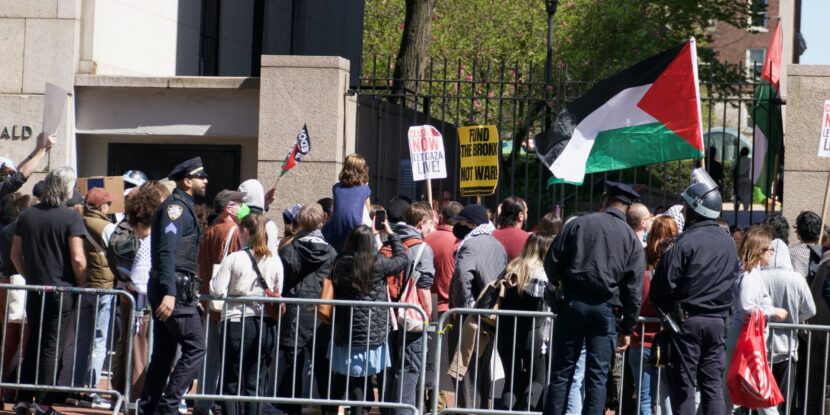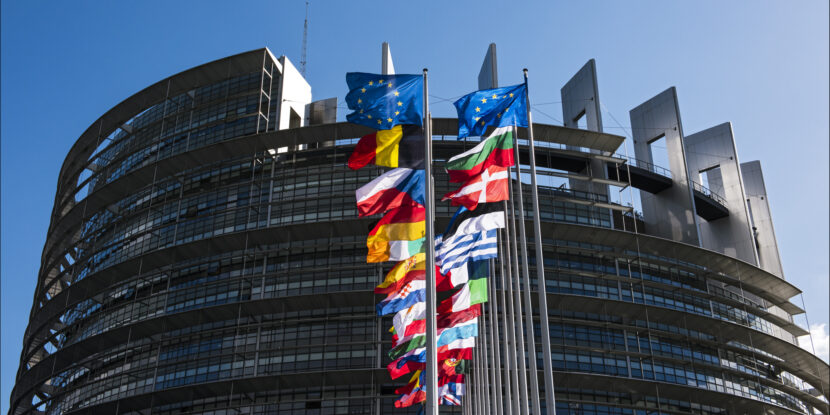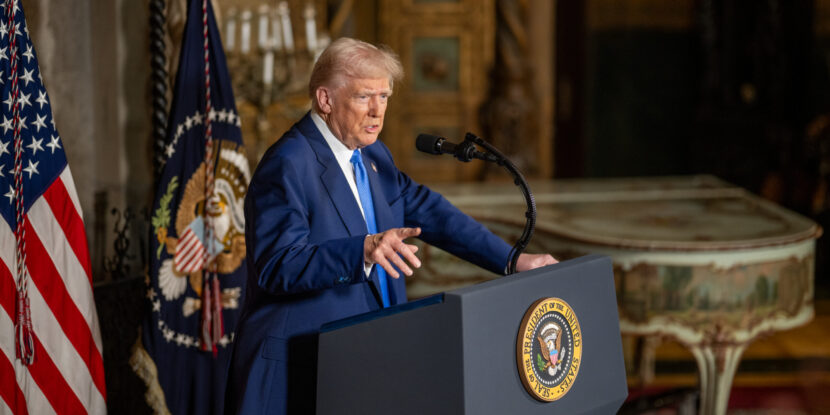
PULSE POINTS:
❓What Happened: U.S. Citizenship and Immigration Services (USCIS) will now screen the social media histories of visa applicants to determine any support or interaction with terrorist organizations, particularly focusing on anti-Semitic terrorism.
👥 Who’s Involved: U.S. Citizenship and Immigration Services, the Department of Homeland Security (DHS), and visa applicants, particularly students and those seeking permanent residency. Leftist groups on college campuses are also reacting.
Your free, daily feed from The National Pulse.
📍 Where & When: The new screening measures are effective immediately across the United States.
💬 Key Quote: “There is no room in the United States for the rest of the world’s terrorist sympathizers, and we are under no obligation to admit them or let them stay here,” stated Tricia McLaughlin, the DHS Assistant Secretary for Public Affairs.
⚠️ Impact: Hundreds of student visas have been revoked, prompting legal challenges and protests from leftist groups.
IN FULL:
U.S. Citizenship and Immigration Services (USCIS) has introduced a new framework for screening social media accounts of immigrants applying for specific visas and residency permissions. This move, effective immediately, is intended to identify applicants who support or engage with terrorist organizations connected to anti-Semitic activities. The new USCIS measures result from an Executive Order signed by President Donald J. Trump, tasking the agency with enhancing scrutiny of foreign nationals aiming to enter the United States.
USCIS’s decision aligns with the Trump administration’s effort to bar those who share views consistent with organizations like Hamas, Hezbollah, and others linked to anti-Semitic violence from obtaining entry into the U.S., especially on student visas. Under this new guidance, applicants for lawful permanent residency and student visas will undergo additional layers of examination.
“There is no room in the United States for the rest of the world’s terrorist sympathizers, and we are under no obligation to admit them or let them stay here,” said Tricia McLaughlin, the DHS Assistant Secretary for Public Affairs, the parent agency of USCIS. Notably, the Trump administration has stated that the new policy has resulted in the cancellation of numerous student visas, drawing protests from leftist groups on college campuses.
Several foreign students who’ve had their visas and permanent residency status revoked are attempting to challenge the action in court. Mahmoud Khalil, a Columbia University graduate student and “pro-Hamas” activist, successfully obtained an order from U.S. District Court Judge Jesse M. Furman last month, preventing—for now—his deportation from the United States.
Likewise, Momodou Taal, a former student of Cornell University and a dual national of the United Kingdom and the Gambia, attempted to challenge his deportation after his visa was canceled due to social media posts urging the “destruction” of the U.S. However, Taal ultimately self-deported after a federal judge denied his request for an order barring his removal from the country.

PULSE POINTS:
❓What Happened: On Wednesday, before President Donald J. Trump announced he would be reducing tariffs on countries that have not “retaliated in any way, shape, or form against the United States,” the European Union (EU) approved an estimated $21 billion in retaliatory tariffs against a number of American exports.
👥 Who’s Involved: The European Union, the European Commission, and U.S. President Donald J. Trump.
Your free, daily feed from The National Pulse.
📍 Where & When: Brussels, Belgium on Wednesday, April 9.
💬 Key Quote: “The EU considers U.S. tariffs unjustified and damaging, causing economic harm to both sides, as well as the global economy. The EU has stated its clear preference to find negotiated outcomes with the U.S., which would be balanced and mutually beneficial,” the European Commission said in a statement.
⚠️ Impact: The EU retaliatory trade measures were to be imposed in three phases from April 15, impacting a number of American goods, including soybeans, motorcycles, orange juice, meat, tobacco, steel, and aluminum. Their fate is unclear now that President Trump has announced he will drop reciprocal tariffs—but not tariffs specific to certain tariffs, such as steel—to 10 percent for everyone but China for 90 days while trade negotiations are conducted.
IN FULL:
The European Union (EU) has cleared the way to impose an estimated $21 billion in retaliatory tariffs on American goods in response to steel and aluminum tariffs enacted by U.S. President Donald J. Trump last month. The European Commission—the EU’s unelected, quasi-executive body—announced the decision on Wednesday, noting that 26 of its 27 member states approved the trade measures. Viktor Orbán’s Hungary was the only EU country to oppose the tariff package.
“The EU considers U.S. tariffs unjustified and damaging, causing economic harm to both sides, as well as the global economy. The EU has stated its clear preference to find negotiated outcomes with the U.S., which would be balanced and mutually beneficial,” The European Commission said in a statement.
The EU tariffs on U.S. goods are to be enacted in three phases, the first of which will take effect next week. Additional tariff measures will be imposed in May, and the final phase will be imposed in December. As of the time of publication, this timeline does not appear to have been changed as a result of President Trump’s pause.
The EU’s retaliatory measure consisted mainly of a 25 percent trade duty on American goods such as soybeans, motorcycles, orange juice, meat, tobacco, steel, and aluminum. However, the list of products hit with the trade levy could grow, if the EU moves forward with retaliatory measures next week in response to President Trump’s 25 percent tariff on European automobiles and the now paused 20 percent reciprocal tariff on all EU goods. It is unclear, now that Trump has paused the reciprocal tariffs, whether the Europeans will move forward with additional retaliatory measures.
Following the EU’s approval of the retaliatory measures, President Trump announced he would reduce U.S. reciprocal tariffs on countries that have not imposed any new import duties on America to a universal 10 percent tariff for 90 days, while they negotiate bilateral trade agreements with the White House. China was the one named exception by Trump, and will instead face a 125 percent tariff for imposing retaliatory levies on the U.S.
Notably, sector-specific U.S. tariffs on products, including steel, aluminum, and automobiles, appear unaffected by this pause.
Today, EU countries backed our proposal to impose trade countermeasures on the United States, in response to unjustified steel and aluminium tariffs.
Duties will apply from 15 April.
They can be lifted at any time, should a fair and balanced negotiated solution be found.
— European Commission (@EU_Commission) April 9, 2025
Image: European Union 2017 – European Parliament.
show less

President Donald J. Trump announced on Wednesday that the United States will now impose a total tariff of 125 percent on Chinese imports, after raising the total trade duty to 104 percent less than 12 hours earlier. In addition, Trump signaled that he would reduce the tariffs imposed on countries that have not moved to retaliate against the U.S. for a 90-day period, as each engages in bilateral talks with the White House.
“Based on the lack of respect that China has shown to the World’s Markets, I am hereby raising the Tariff charged to China by the United States of America to 125%, effective immediately. At some point, hopefully in the near future, China will realize that the days of ripping off the U.S.A., and other Countries, is no longer sustainable or acceptable,” Trump wrote in a post on Truth Social, in response to China raising retaliatory tariffs on the U.S.
Your free, daily feed from The National Pulse.
Notably, the increasing tariff rate on Chinese goods appears to be forcing the People’s Bank of China (PBOC) into a series of emergency devaluations of the Chinese yuan, leading to increasing concerns for the Chinese economy.
The President continued: “Conversely, and based on the fact that more than 75 Countries have called Representatives of the United States, including the Departments of Commerce, Treasury, and the [United States Trade Representative], to negotiate a solution to the subjects being discussed relative to Trade, Trade Barriers, Tariffs, Currency Manipulation, and Non Monetary Tariffs, and that these Countries have not, at my strong suggestion, retaliated in any way, shape, or form against the United States, I have authorized a 90 day PAUSE, and a substantially lowered Reciprocal Tariff during this period, of 10%, also effective immediately.”
According to the White House, over 75 countries have now asked to engage in bilateral talks, with only China, the European Union (EU), and Canada having threatened any significant relation. Treasury Secretary Scott Bessent, speaking Wednesday afternoon, emphasized that the pause is necessary because of the number of nations entering talks, and the fact that President Trump wants to be a part of each negotiation.
READ:
show less
President Donald J. Trump announced on Wednesday that the United States will now impose a total tariff of 125 percent on Chinese imports, after raising the total trade duty to 104 percent less than 12 hours earlier. In addition, Trump signaled that he would reduce the tariffs imposed on countries that have not moved to retaliate against the U.S. for a 90-day period, as each engages in bilateral talks with the White House. show more

 2 months ago
4
2 months ago
4








 English (US) ·
English (US) ·